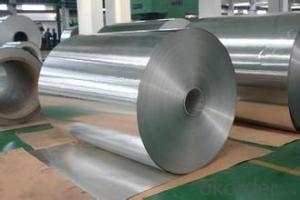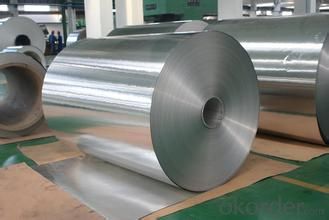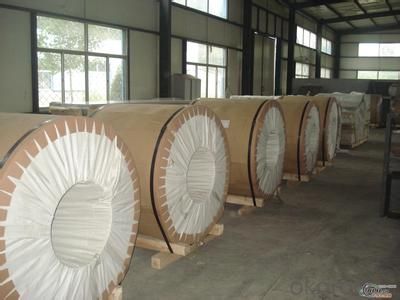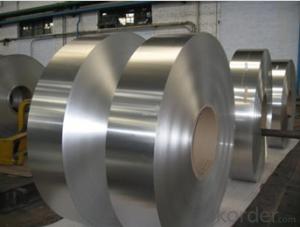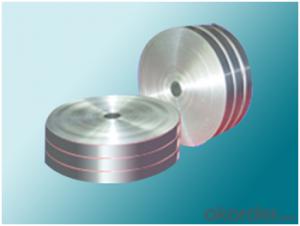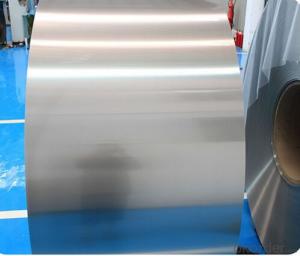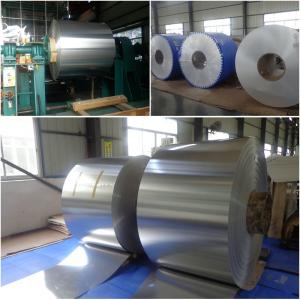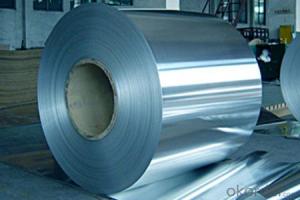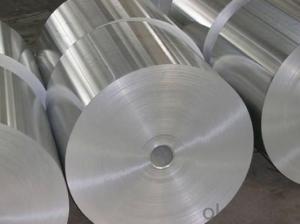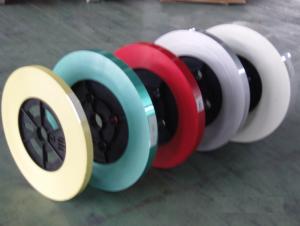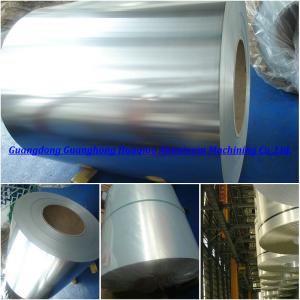Mill Finish Aluminum Zinc Alloy Steel Coil
- Loading Port:
- China Main Port
- Payment Terms:
- TT OR LC
- Min Order Qty:
- -
- Supply Capability:
- -
OKorder Service Pledge
OKorder Financial Service
You Might Also Like
Aluminium is a relatively soft, durable, lightweight, ductileand malleablemetalwith appearance ranging from silvery to dull gray, depending on the surfaceroughness. It is nonmagnetic and does not easily ignite. A fresh film ofaluminium serves as a good reflector (approximately 92%) of visible lightand an excellent reflector (as much as 98%) of medium and far infraredradiation. The yield strength of pure aluminium is 7–11 MPa,while aluminium alloys have yield strengths ranging from200 MPa to 600 MPa. Aluminium has about one-third the densityand stiffness of steel. It is easily machined,cast, drawn and extruded.
Aluminium alloys (or aluminum alloys; see spellingdifferences) are alloysin which aluminium(Al) is the predominant metal. The typical alloying elements are copper, magnesium,manganese,silicon,tin and zinc. There are twoprincipal classifications, namely casting alloys and wrought alloys, both of which are furthersubdivided into the categories heat-treatableand non-heat-treatable. About 85% of aluminium is used for wrought products,for example rolled plate, foils and extrusions.Cast aluminium alloys yield cost-effective products due to the low meltingpoint, although they generally have lower tensile strengthsthan wrought alloys. The most important cast aluminium alloy system is Al–Si,where the high levels of silicon (4.0–13%) contribute to give good castingcharacteristics. Aluminium alloys are widely used in engineering structures andcomponents where light weight or corrosion resistance is required
Specification:
Alloy: AA1050, 1060, 1100,AA3003, 3005, 3015, 5052, 5754, 5083,8011, etc
Temper: H14/16/18/22/24/32,HO etc.
Thickness: 0.2mm—100mm
Width: 100mm—2300mm (Can be slitted)
Inner Diameter:508MM
Coil Weight:500kg-3000kg(Max.)
Application:Foil stock, Circles, Roofing, Can stock, Marine plate,Anti-slipery purpose in vehicles, packing and appliance.
Features:
1. Excellent quality of products
2. Quick delivery
3. Best service to clients
4. BV,SGS avalible
5. No buckle o waveness
6. Tension leveling
7. Certificate of Origin
8. Form A,E
Packaging Detail:
Carton ,Woodenpallet with plastic protection packing ,standard seaworthy packing or as yourrequest.
Production Capacity:
AnnualProduction capacity of 600,000 tons.
Products areexported to United States, Canada, U.A.E, Brazil, Mexico,Thailand, Vietnam,Nigeria etc, over 100 countries andregions all over the world.
Production Line:
CNBM aluminumproduction base is comprised of 18 aluminumannealers, 10 coil and foilmills, 4 continuous production lines, 2hot rolling production line and 3prepainted lines.
FAQ:
1. What is the form of payment?
Normally 30% TT, L/C
2. Type of quotation?
FOB, CFR, CIF
3. Port of loading?
Shanghai port
4. Delivery time?
30 days after client’s deposit
- Q: Are aluminum coils suitable for outdoor signage and displays?
- Yes, aluminum coils are suitable for outdoor signage and displays. Aluminum is a highly durable and weather-resistant material, making it an excellent choice for outdoor applications. It is known for its ability to withstand extreme temperature variations, UV rays, moisture, and corrosion. Aluminum coils are lightweight, yet strong, which makes them easy to handle and install. They are also versatile and can be easily shaped and formed into various sizes and designs. In addition, aluminum has excellent printability, allowing for vibrant and long-lasting graphics. Overall, aluminum coils provide a reliable and cost-effective solution for outdoor signage and displays.
- Q: Are aluminum coils suitable for high-strength applications?
- No, aluminum coils are not typically suitable for high-strength applications. Aluminum has lower tensile strength compared to other metals like steel, making it less ideal for high-stress or heavy-duty applications where strength is a critical factor.
- Q: How do aluminum coils contribute to energy-efficient lighting installations?
- The energy efficiency of lighting installations is greatly enhanced by the use of aluminum coils. Firstly, aluminum, being highly conductive, effectively transfers heat away from the lighting system. This prevents heat accumulation, which can negatively impact the performance and lifespan of the lighting fixtures. By effectively dissipating heat, aluminum coils ensure that the lights operate at their highest efficiency by maintaining optimal operating temperatures. Furthermore, aluminum coils are lightweight, which makes them easier to handle and install. This reduces the overall weight of the lighting fixtures, making them more convenient to mount and manipulate during installation. The reduced weight also leads to lower energy consumption during transportation and installation, thus promoting long-term energy efficiency. Additionally, aluminum coils are highly durable and resistant to corrosion, making them ideal for lighting installations exposed to various environmental conditions. This durability reduces the need for frequent replacements or repairs, resulting in lower energy consumption associated with maintenance. Moreover, aluminum is a recyclable material, meaning that the coils can be easily reused or repurposed at the end of their life cycle. Recycling aluminum requires significantly less energy compared to producing new aluminum, leading to a reduced carbon footprint and overall lower energy consumption. In summary, aluminum coils offer numerous benefits in terms of energy efficiency for lighting installations. Their efficient heat dissipation, lightweight nature, durability, and recyclability contribute to optimized performance, reduced energy consumption, and a more sustainable lighting solution.
- Q: Can aluminum coils be used for electrical conductors?
- Yes, aluminum coils can be used for electrical conductors. Aluminum is a highly conductive metal that is commonly used in electrical applications. It has a high electrical conductivity, second only to copper, making it a suitable material for conducting electricity. Aluminum coils are often used in various electrical devices and installations, such as transformers, motors, generators, and power transmission lines.
- Q: How do aluminum coils compare to other metals in terms of strength?
- Compared to numerous other metals, aluminum coils possess an exceptional strength-to-weight ratio. Although not as robust as steel, aluminum is both lighter and more pliable, rendering it a favored option in diverse applications. Aluminum coils are capable of enduring substantial forces without fracturing or distorting, thereby rendering them suitable for a broad array of industries, encompassing automotive, aerospace, and construction. Furthermore, these coils exhibit commendable resistance to corrosion, thereby bolstering their longevity and durability. However, it is crucial to acknowledge that the strength of aluminum may fluctuate depending on the chosen alloy and temper. Thus, specific comparisons ought to be conducted based on the particular application and stipulations.
- Q: Can aluminum coils be anodized?
- Indeed, it is possible to anodize aluminum coils. Anodizing, an electrochemical technique, enhances the existing oxide layer on the aluminum's surface, rendering it denser, sturdier, and more resistant to corrosion. This particular process finds widespread usage in aluminum sheets, plates, and coils. Anodizing can be effectively employed on both flat and shaped aluminum coils, imparting them with a plethora of appealing hues and finishes. Furthermore, the anodized coating significantly improves the aluminum's capacity to accommodate paint and adhesives, thereby rendering it a highly sought-after option for numerous applications, including architectural cladding, automotive trim, and electronic components.
- Q: Is it possible to utilize aluminum coils in the creation of decorative objects?
- <p>Yes, aluminum coils can be used for making decorative items. They are lightweight, durable, and corrosion-resistant, making them an excellent choice for various decorative applications. Aluminum's malleability allows it to be easily shaped and bent into different forms, which is ideal for creating intricate designs. Additionally, aluminum can be anodized or painted to achieve a wide range of colors and finishes, enhancing its decorative appeal. Common decorative uses include outdoor furniture, lighting fixtures, and architectural accents.</p>
- Q: Some makes like KIA make a point of having aluminum engines. I thought this was for weight, but was more prone to failure, especially in a high mileage car.
- depends. i had a 79 F150, obviously engine made of steel. I let the water run out, the oil run out, the tranny fluid run out, etc. Couldnt kill that truck. I think the aluminum engines built today are fine, depending on the manufacturer. You cant run these engines into the ground though. I have had hondas and toyotas that ran forever with aluminum engines. Chrysler (dodge and plymouth) aluminum engines i have found are junk. I have been told by people who know to never buy a kia. if you can't afford a new car, buy a used one, like toyota, honda, never a nissan though. engines are just as good but the rest of the car is made out of pot metal. mazda is my favorite and many a ford has mazda engineering inside. the ford escape 4 cylinder is what i drive. it has a mazda engine.
- Q: What are the different alloys used in aluminum coils?
- Aluminum coils are made using various alloys, each possessing unique properties and applications. Some commonly employed alloys include: 1. 3003: Renowned for its exceptional formability and resistance to corrosion, this alloy finds frequent use in applications requiring moderate strength, such as automotive components, storage tanks, and kitchen utensils. 2. 5052: An alloy characterized by its versatility, good corrosion resistance, high fatigue strength, and excellent weldability. It is commonly utilized in the production of aircraft fuel tanks, marine components, and architectural applications. 3. 6061: Distinguished by its high strength and excellent machinability, 6061 is often employed in structural components like frames and braces. It also offers good corrosion resistance, making it a popular choice in the aerospace and automotive industries. 4. 8011: Primarily used in the packaging industry, particularly for manufacturing aluminum foil. This alloy provides good formability, high tensile strength, and excellent resistance to moisture and chemicals. 5. 1100: A commercially pure aluminum alloy, prized for its high electrical and thermal conductivity. It is commonly utilized in electrical wiring, heat exchangers, and lighting fixtures. These examples represent only a fraction of the alloys available for aluminum coils, as there are numerous other variations tailored to specific requirements and applications. The choice of alloy depends on several factors, such as desired strength, corrosion resistance, formability, and cost considerations.
- Q: What are the different types of aluminum coils?
- Aluminum coils come in a variety of types, each with its own unique properties and uses. Let's take a look at some common examples: 1. Pure Aluminum Coils: Made from pure aluminum, these coils find applications in packaging, construction, and automotive industries. 2. Textured Aluminum Coils: These coils have a surface with texture or patterns, adding aesthetic appeal and providing grip or anti-slip properties. They are commonly used in architectural designs, signage, and decorative applications. 3. Coated Aluminum Coils: These coils have a protective coating applied to the surface, offering enhanced durability, weather resistance, and aesthetic customization. They are often used in building facades, roofing, and cladding systems. 4. Anodized Aluminum Coils: Through an electrochemical process called anodization, a layer of oxide is formed on the surface of the aluminum, making it more resistant to corrosion and wear. Anodized aluminum coils are commonly used in architectural applications, electronics, and automotive parts. 5. Pre-painted Aluminum Coils: With a layer of paint applied to the surface, these coils provide protection against weathering and add color aesthetics. They are frequently used in the construction industry for roofing, siding, and insulation purposes. 6. Stucco Patterned Aluminum Coils: These coils have a raised pattern resembling stucco, adding texture and strength to the aluminum. They are commonly used in refrigerators, air conditioners, and other appliances. 7. Clad Aluminum Coils: These coils consist of two or more layers of aluminum bonded together, offering enhanced strength, durability, or specific properties. They find applications in industries such as aerospace, defense, and transportation. In summary, the choice of aluminum coil type depends on specific application requirements, including appearance, corrosion resistance, durability, and mechanical properties.
Send your message to us
Mill Finish Aluminum Zinc Alloy Steel Coil
- Loading Port:
- China Main Port
- Payment Terms:
- TT OR LC
- Min Order Qty:
- -
- Supply Capability:
- -
OKorder Service Pledge
OKorder Financial Service
Similar products
Hot products
Hot Searches
Related keywords
